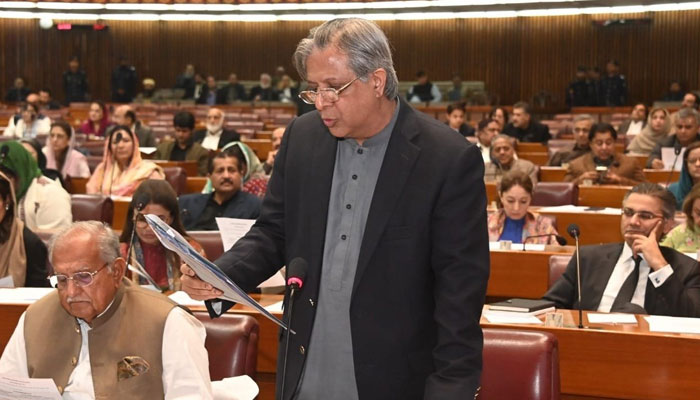
[ad_1]
ISLAMABAD: The Senate has approved long-awaited 26th constitutional amendment with two third majority – 65 votes – aimed at ensuring quick justice in the country and bringing transparency in judicial system, by incorporating all amendments proposed by Ulema-e-Islam-Fazl (JUI-F), here on Sunday.
As per the details, Law and Justice Minister Azam Nazir Tarar presented the 26th Constitution Amendment Bill 2024 in the House. The House passed the bill through clause-wise reading.
The 27-clause Bill proposes amendments in various articles of the Constitution. A new Article 9A regarding clean and healthy environment has also been included in the Bill, under which everyone shall have the right to a clean, healthy and sustainable environment.
65 members voted in favour of the bill while only four voted against it.
JUI(F)’s Kamran Murtaza moved amendments one by one which were incorporated in the bill after the government did not oppose it.
Earlier speaking in the House, the Minister of Law and Justice Azam Nazir Tarar said that the government, its allied parties and JUI (F) have agreed on the draft of the constitutional amendment bill.
As part of the government’s efforts, a special parliamentary committee comprising representatives of all political parties, including the opposition Pakistan Tehreek-e-Insaf (PTI), discussed the proposed constitutional package.
He added that the procedure for appointing judges to the Supreme Court was changed in the 18th Amendment. He added that both the Prime Minister and the President have relinquished their powers and handed over their powers to Parliament to bring more transparency in the appointment of judges.
He said that the parliamentary committee has the authority to approve or reject the nomination of judges. However, he said that the 18th constitutional amendment was challenged in the court and during the proceedings of the case, a message was sent to the then government that the amendment would be scrapped.
The Minister admitted that the 19th Amendment was passed in haste to change the composition of the Judicial Commission (JC) and the Parliamentary Committee on Appointment of Judges. Hence the powers of the Parliamentary Committee were reduced.
Azam Nazir said that even bar councils including the Pakistan Bar Council and other representative organizations of lawyers criticized and demanded a review of the decision. He demanded that appropriate amendments be made in Article 175-A of the Constitution.
Now, he said, the JC, the Chief Justice of Pakistan (CJP) responsible for appointment and confirmation of judges, four senior judges of the Supreme Court, four parliamentarians, the Law Minister, one with at least 15 years of experience. The lawyer shall consist of and the Attorney General. He further said that out of the four parliamentarians, two members each from the Senate and the National Assembly
He said that one member of the JC will either be a woman or a non-Muslim eligible to become a senator on the Technocrat seat, the nomination will be made by the Speaker of the National Assembly.
He said that no change has been made in the Provincial Judicial Commissions where the Chief Justice of the High Court, senior judges and the Provincial Law Minister will continue to evaluate the performance of the judges.
The minister said that the amendment outlined the procedure for appointing the Chief Justice, making it clear that the Prime Minister would no longer exercise this power, instead handing it over to Parliament. A 12-member committee will finalize the nominations and forward them to the prime minister, he said, adding that the chief justice would serve either till retirement or for a maximum of three years.
He said that the appointment of the Chief Justice is part of the reform package, three senior judges are being considered for the post, one of whom will be selected as the Chief Justice of Pakistan (CJP).
The minister said that the procedure for the formation of constitutional benches at the Supreme Court and at the provincial level has been clarified, logistical preparations are needed at the provincial level. He said that the provincial assemblies, with a 51 percent majority, could pass a resolution to establish a provincial constitution bench.
He said that the formation of these benches will be under the authority of the JC headed by the Chief Justice.
He said that the establishment of the Constitutional Court was part of the Covenant of Democracy (COD) which was signed by Shaheed Benazir Bhutto and Muhammad Nawaz Sharif in 2006. Chairman PPP Bilawal Bhutto also raised this issue which was part of the agenda of democracy.
He said that in the past, elected Prime Ministers were removed from their posts by following Article 184 of the Constitution, though there was a clear procedure in Article 195 of the Constitution. He added that the prime minister elected in 2022 was removed through a vote of no confidence under Article 195 of the Constitution.
He said Kamran Murtaza of Jamiat Ulema-e-Islam (JUI) proposed five amendments which have already been included in the draft.
[ad_2]
Source link






